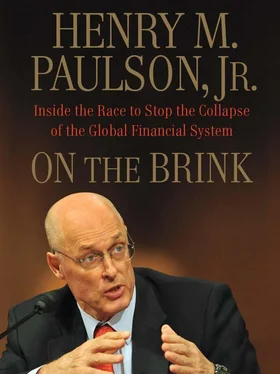Sunday morning at 11:00, Jim Lockhart and I officially unveiled the Fannie Mae and Freddie Mac rescue with a statement to the press. I described four key steps we were taking: FHFA would place the companies into conservatorship; the government would provide up to $100 billion to each company to backstop any capital shortfalls; Treasury would establish a new secured lending credit facility for Fannie and Freddie and would begin a temporary program to buy mortgage-backed securities they guaranteed, to boost the housing market.
I wanted to cut through all the complex finance and get to the heart of our actions and what they meant for Americans and their families. The GSEs were so big and so interwoven into the fabric of the financial system that a failure of either would mean grave distress throughout the world.
“This turmoil,” I said, “would directly and negatively impact household wealth: from family budgets, to home values, to savings for college and retirement. A failure would affect the ability of Americans to get home loans, auto loans, and other consumer credit and business finance. And a failure would be harmful to economic growth and job creation.”
It would also have major international financial ramifications. Among the many financial leaders I spoke to that day were my old friends Zhou Xiaochuan, the head of the central bank of China, and Wang Qishan, vice premier in charge of China’s financial and economic affairs. It was important to relay what was going on to the Chinese, who owned a vast quantity of U.S. securities, including hundreds of billions of dollars of GSE debt. They had trusted our assurances and held on to this paper at a crucial time in a shaky market. Fortunately, I knew both men well, and we had been able to speak frankly to one another throughout the crisis.
“I always said we’d live up to our obligations,” I reminded Wang. “We take them seriously.”
“You’re doing everything you know how to,” Wang said, adding that the Chinese would continue to hold their positions. He congratulated me on our moves but struck a cautious note: “I know you think this may end all of your problems, but it may not be over yet.”
Still, that Sunday afternoon in my office, placing calls all around the world, I couldn’t help but feel a bit relieved. We had just pulled off perhaps the biggest financial rescue in history. Fannie and Freddie had not been able to stop us, Congress was supportive, and the market looked sure to accept our moves.
I was alone, looking out the tall windows of my office, which faced south toward the National Mall. I was not naïve. I knew there were plenty of danger spots in the financial system and in the economy, but I felt a burden lift off of me as I looked out on the Washington Monument. I had come to Washington to make a difference, and we had, I thought, just saved the country—and the world—from financial catastrophe.
The next day, Lehman Brothers began to collapse.
Sunday, May 28, 2006
I come from a line of strong women—smart, independent, plainspoken women. When my mother learned that President Bush was going to nominate me to be Treasury secretary and that I had agreed to take the job, she didn’t mince words.
“You started with Nixon and you’re going to end with Bush?” she moaned. “Why would you do such a thing?”
It was the Sunday of Memorial Day weekend in 2006. My mother and I were in the kitchen of my boyhood home in Barrington, Illinois. My wife, Wendy, and I owned a home just down a shared driveway and we had flown in for the weekend to think things through—and to tell my mother.
The president was set to announce his intent to nominate me on Tuesday. I was scheduled to return to New York later that day to talk to the Goldman Sachs board and to meet with Lloyd Blankfein, my successor as CEO, on Memorial Day. That morning I had made the mistake of telling a good friend in church my news, but I forgot to tell her that I hadn’t yet told my mother. By the time I walked up to Mom’s house, she was in tears.
“You’re going to do what you’re going to do,” she said. “But I hope you don’t get confirmed.”
It was just after noon, and Mom was sitting in a wooden chair at the table in the breakfast room, staring through the window at a beautiful white oak in her sunlit yard. I couldn’t remember the last time I had seen her cry. Her harsh criticism was also a first—usually she was a loyal, adoring mother who supported my decisions unstintingly.
My mother’s feelings marked a dramatic shift from my youth. Staunch Republicans, she and my father had been delighted when, in my first job after business school, I went to work at the Pentagon and later in Richard Nixon’s White House. But after Watergate, and as she got older—and especially after my dad passed away in 1995—my mother had become a lot more liberal, particularly in her views about women’s and environmental issues. Republicans irritated her on the subject of abortion. She began to support various Democratic candidates, hated the war in Iraq, and was very anti–George W. Bush.
She wasn’t alone in my family. Wendy, a college classmate and supporter of Hillary Clinton’s, vehemently opposed my taking the job, as did our son, Merritt. Only our daughter, Amanda, the most liberal member of the family, understood and supported my decision.
“Mom, I’ve been asked to serve my country,” I said, doing my best to calm her down. “And that’s what I am going to do.”
“Well,” she replied, unconsoled, “you’ll be jumping onto a sinking ship.”
I returned to New York on an afternoon flight. Wendy stayed behind to comfort my mom, then flew back a couple of days later. She remembers standing in front of a television monitor in O’Hare airport and watching in anguish as the president announced my appointment in the Rose Garden, with me by his side.
My mother did not take calls for 24 hours. Then, on Wednesday, when the press was filled with largely favorable coverage, Mom finally started answering the phone. It helped that the callers weren’t saying, “How could your idiot son do this?” They were calling to congratulate her.
My mother inherited her grit and determination from her own mother, Kathryn Schmidt, who graduated from Wellesley College in 1914 and supported her family through the Depression with a catering business. She died when I was just six months old.
My mom, Marianna Gallauer, followed her to Wellesley, graduating in 1944. An athletic woman, she has remained active throughout her life—in community matters and in sports. She continued to downhill-ski at age 86 and, during baseball season, she drives herself into Chicago to watch the Cubs play at Wrigley Field.
She and my father, Henry Merritt Paulson, were married in 1944. I am the oldest of three children, followed by my brother and best friend, Dick, who is two years younger and worked as a bond salesman at Lehman Brothers before moving to Barclays. My sister, Kay, who is five years younger, is a residential real estate broker in Colorado.
My father also came from the Midwest. His mother, Rosina Merritt, grew up on a Wisconsin farm, a descendant of Wesley Merritt, the Civil War general and onetime superintendent of West Point. After receiving a master’s degree in psychology from New York’s Columbia University, she returned to Wisconsin to teach. My grandfather Henry Paulson attended school only through the eighth grade, but this son of a Norwegian immigrant farmer was a driven, self-taught man. He founded and ran Henry Paulson & Company, a successful wholesale watch supply and repair business in Chicago that, at its height, supported a prosperous lifestyle: my grandparents lived in Evanston, outside of Chicago, and had a modest winter home in Palm Beach, Florida.
Читать дальше












